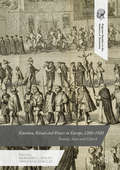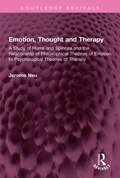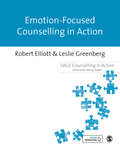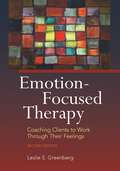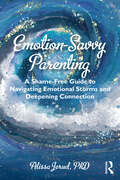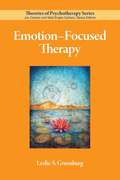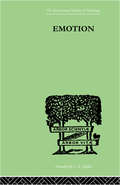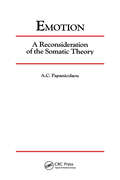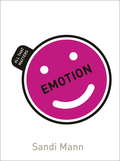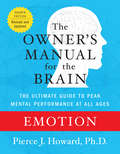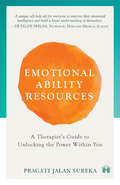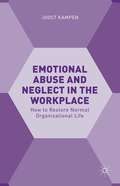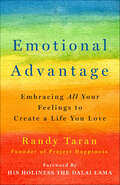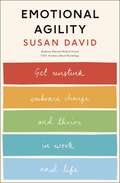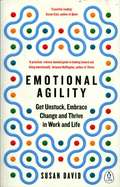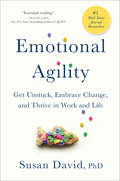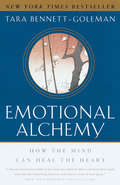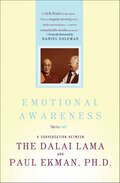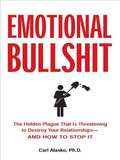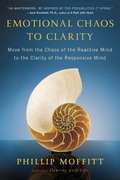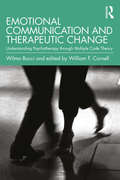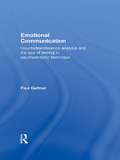- Table View
- List View
Emotion, Ritual and Power in Europe, 1200–1920: Family, State and Church (Palgrave Studies in the History of Emotions)
by Katie Barclay Merridee L. BaileyThis volume spans the fourteenth to nineteenth centuries, across Europe and its empires, and brings together historians, art historians, literary scholars and anthropologists to rethink medieval and early modern ritual. The study of rituals, when it is alert to the emotions which are woven into and through ritual activities, presents an opportunity to explore profoundly important questions about people’s relationships with others, their relationships with the divine, with power dynamics and importantly, with their concept of their own identity. Each chapter in this volume showcases the different approaches, theories and methodologies that can be used to explore emotions in historical rituals, but they all share the goal of answering the question of how emotions act within ritual to inform balances of power in its many and varied forms. Chapter 5 of this book is available open access under a CC BY 4.0 license.
Emotion, Thought and Therapy: A Study of Hume and Spinoza and the Relationship of Philosophical Theories of Emotion to Psychological Theories of Therapy (Routledge Revivals)
by Jerome NeuFirst published in 1977, Emotion, Thought and Therapy is a study of Hume and Spinoza and the relationship of philosophical theories of the emotions to psychological theories of therapy. Jerome Neu argues that the Spinozists are closer to the truth; that is, that thoughts are of greater importance than feelings in the classification and discrimination of emotional states. He then contends that if the Spinozists are closer to the truth, we have the beginning of an argument to show that Freudian or analytic therapies make philosophic sense. Throughout the book, careful attention is paid to modern discussions in philosophy of mind and psychology, and materials from anthropology and other relevant disciplines are considered. At the centre of the discussion is the notion of ‘thought-dependence’. Therapies for psychological disorders are placed along a spectrum in accordance with the role they assign to thoughts. The Spinozist view of the emotions can be seen as at the extreme thought end of a corresponding spectrum of theories of the emotions. The book suggests that this stream may help explain the spectrum of therapeutic theories and the possibilities that exist for psychological development and change. This book will be of interest to students of philosophy, psychology and counselling.
Emotion-Focused Counselling in Action (Counselling in Action series)
by Robert Elliott Leslie GreenbergThis is the definitive introduction to the theory and practice of emotion-focused counselling. Starting with an introduction to the main theory and concepts, it then guides you through the counselling phases from beginning to end. The final chapter extends your learning by examining different client populations, process research, and ways of monitoring your practice. Chapters include features such as case studies and transcripts, further reading sections and reflective exercises that help you to enhance your understanding of the approach.
Emotion-Focused Counselling in Action (Counselling in Action series)
by Robert Elliott Leslie GreenbergThis is the definitive introduction to the theory and practice of emotion-focused counselling. Starting with an introduction to the main theory and concepts, it then guides you through the counselling phases from beginning to end. The final chapter extends your learning by examining different client populations, process research, and ways of monitoring your practice. Chapters include features such as case studies and transcripts, further reading sections and reflective exercises that help you to enhance your understanding of the approach.
Emotion-Focused Therapy: Coaching Clients to Work Through Their Feelings
by Leslie S. GreenbergIn this seminal volume, master clinician and founder of emotion-focused therapy (EFT) Leslie Greenberg presents a comprehensive overview of EFT—a treatment that helps clients identify, experience, accept, explore, interpret, transform, and flexibly manage their emotions. Essentially, the approach helps clients increase their emotional intelligence and achieve greater well-being. EFT&’s influence has grown in the decade since the first edition of this book was published. There have been significant theoretical and empirical advances, and the approach has been applied successfully to new clinical populations. This second edition incorporates the latest theory and research on EFT. It also includes a new chapter on specific marker-guided interventions and case formulation, as well as chapters on forgiveness and working with emotion in organizational leadership. This essential guide to EFT is required reading for all therapists who believe that accessing emotions can be a source of healing and wisdom.
Emotion-Savvy Parenting: A Shame-Free Guide to Navigating Emotional Storms and Deepening Connection
by Alissa JerudIntense emotions – whether your own or your child’s – can make it incredibly difficult to be the parent you want to be. This book is designed to help you become a more emotionally agile parent so you can better navigate whatever emotional storms you inevitably encounter. Emotion-Savvy Parenting is an empowering, science-informed guide for breaking free of the hold that unwanted emotions so often have over parents. With compassion and wit, licensed clinical psychologist Dr. Alissa Jerud draws on decades of research to present a refreshing, theory-driven approach that encourages parents to focus on changing the only behaviors they truly have control over: their own. Rooted in highly effective, cognitive-behavioral strategies and a respectful, relationship-centered stance, her ART (Accept, Regulate, and Tolerate) framework enables parents to relate more skillfully to challenging emotions, model invaluable lessons, connect more deeply with their kids, and enjoy parenting more.Packed with real-life examples and step-by-step techniques, this book supports parents of infants to teens in creating a more harmonious home by becoming their ideal, most emotionally adept selves. It also serves as a valuable resource for educators and mental health professionals seeking to help lighten the heavy load of parenthood.
Emotion-focused Therapy
by Leslie S. GreenbergLeslie s. Greenberg provides a thorough introduction to this feeling-centered, humanistic approach to therapy. Emotion-focused therapy emphasizes the awareness, acceptance, and understanding of emotion, and proposes that emotions themselves have an adaptive potential that, if activated, can help clients to change.
Emotion: A COMPREHENSIVE PHENOMENOLOGY OF THEORIES AND THEIR MEANINGS for
by Hillman, JamesThis is Volume XIV of thirty-eight in a series on the General Psychology. Originally published in 1960, this study offers A Comprehensive Phenomenology of Theories and their Meanings for Therapy.
Emotion: A Reconsideration Of
by Andrew C. PapanicolaouThe author explores the question of the nature of emotion by critically examining three theoretical approaches - the somatic or peripheralist, the cerebrocentric, and the cognitive. In finding the somatic approach superior to the others, the author explicitly challenges current conceptions regarding the nature of emotion. Giving particular emphasis to the works of William James, the author recasts the somatic theory in detail and demonstrates how it best fits the available clinical experimental data. Written in jargon-free language, the book presents to specialists and non-specialists alike an overview of this topic.
Emotion: All That Matters
by Sandi MannDespite decades of debate, psychologists are still undecided on what exactly emotion is. This book will help students and general readers to explore emotion and reach their own conclusions. The fascinating, and sometimes controversial, topics covered include what emotions actually are, how they are portrayed and recognised, why negative emotions arise and how they can be managed, whether emotion can be effectively faked or hidden, and how emotions affect decision-making. A final chapter, 'The route to happiness', discusses the most sought-after emotion of all, and asks how the research around emotion can be applied practically.
Emotion: All That Matters (All That Matters)
by Sandi MannDespite decades of debate, psychologists are still undecided on what exactly emotion is. This book will help students and general readers to explore emotion and reach their own conclusions. The fascinating, and sometimes controversial, topics covered include what emotions actually are, how they are portrayed and recognised, why negative emotions arise and how they can be managed, whether emotion can be effectively faked or hidden, and how emotions affect decision-making. A final chapter, 'The route to happiness', discusses the most sought-after emotion of all, and asks how the research around emotion can be applied practically.
Emotion: The Owner's Manual
by Pierce HowardCutting-edge, user-friendly, and comprehensive: the revolutionary guide to the brain, now fully revised and updatedAt birth each of us is given the most powerful and complex tool of all time: the human brain. And yet, as we well know, it doesn't come with an owner's manual--until now. In this unsurpassed resource, Dr. Pierce J. Howard and his team distill the very latest research and clearly explain the practical, real-world applications to our daily lives. Drawing from the frontiers of psychology, neurobiology, and cognitive science, yet organized and written for maximum usability, The Owner's Manual for the Brain, Fourth Edition, is your comprehensive guide to optimum mental performance and well-being. It should be on every thinking person's bookshelf. What are the ingredients of happiness? Which are the best remedies for headaches and migraines? How can we master creativity, focus, decision making, and willpower? What are the best brain foods? How is it possible to boost memory and intelligence? What is the secret to getting a good night's sleep? How can you positively manage depression, anxiety, addiction, and other disorders? What is the impact of nutrition, stress, and exercise on the brain? Is personality hard-wired or fluid? What are the best strategies when recovering from trauma and loss? How do moods and emotions interact? What is the ideal learning environment for children? How do love, humor, music, friendship, and nature contribute to well-being? Are there ways of reducing negative traits such as aggression, short-temperedness, or irritability? What is the recommended treatment for concussions? Can you delay or prevent Alzheimer's and dementia? What are the most important ingredients to a successful marriage and family? What do the world's most effective managers know about leadership, motivation, and persuasion? Plus 1,000s more topics!
Emotional Ability Resources: A Therapist's Guide to Unlocking the Power within You
by Pragati Jalan SurekaA unique self-help aid to improve emotional intelligence. – Felipe Fregni, MD, PhD, MPH, Med, Professor of Physical Medicine & Rehabilitation, Harvard Medical School &‘Makes it easy to explore our difficult inner emotional landscape and gain and clarity.&’ – Aparna Piramal Raje, Author of Chemical Khichdi, motivational speaker, and mental health advocate Have an issue? Give EAR to it . . . Most of us find it difficult to cope with our emotions. Embarrassed to discuss it, rarely do we turn to anyone for advice. But how can we tell our story by keeping our emotions in the dark, especially from ourselves? This unique book is an essential resource on every tabletop, every bookshelf, and every household. It is for anyone who wants to reap the tangible benefits of building self-leadership through emotional intelligence. Through narratives, anecdotes, simple explanations, and exercises peppered throughout this book, you will be able to relate, identify, and solve the complexities of emotions that influence your daily routine. In essence, this handbook is your gateway to emotional and mental wellness. Emotional Ability Resources provides the right tools to access all the emotions that build up inside you or do not. It encourages you to listen to them, be more self-aware, and unlock the power you already possess. It invites you to learn about handling your inner world in an easy and healthy manner.
Emotional Abuse and Neglect in the Workplace: How To Restore A Normal Organizational Life
by Joost KampenEmotional Abuse and Neglect in the Workplace tackles the big questions: How does emotional neglect of employees affect an organization? How can management effectively manage while restoring an organization’s health? When trust is gone, only reliable behavior by senior managers can help - and this takes time. The author explores striking similarities between the symptoms of ailing organizations and abusive or neglectful families. This book explores not only a new theory of neglected organizations, but also a set of methods enabling OD practitioners to restore employees’ trust. It also provides diagnostic tools and guidelines for change agents who confront organizational neglect head-on and includes case studies and real-life experiences of OD practitioners.
Emotional Advantage: Embracing All Your Feelings to Create a Life You Love
by Randy Taran“An antidote to emotional overwhelm—a powerful way to discover how useful your emotions can be in guiding you towards your best life.” —Marci Shimoff, #1 New York Times–bestselling author of Happy for No ReasonAward-winning author, producer, and founder of Project Happiness, Randy Taran knows that every emotion, feeling, and mental state has the power to bring us back to our true essence. Emotional Advantage is your guide to getting there.We’ve learned a lot about the science of happiness and positive psychology, but what about the full range of human emotions, all of which factor into the human experience? What do we do when happiness eludes us—when life does not go as planned? It turns out that even negative emotions have something to offer, if we know how to learn from them. Have you ever woken up in a fog of feelings and felt directionless? Or maybe it was hard to pinpoint exactly what you were feeling, but it wasn’t where you wanted to be? What if we could actually use our feelings as a pathway to guide us back to our inner compass? What if, like alchemists, we had the tools to transform our emotions to take charge of creating our very best life? What if we could comprehend how even the most troublesome emotions are sending messages to alert, protect, and fuel us forward?Neuroscience reveals that to understand and utilize any emotion, we need to “name it to tame it.” Emotional Advantage shows us how a new perspective on fear can move us to courage, how guilt can clarify our values, and how anger can help us create healthy boundaries.“A guidebook to embracing the real version of yourself. If you’ve ever had to hide your feelings, or if you ever experience guilt or regret, you’ll feel like it’s written directly for you.” —Chris Guillebeau, author of The Happiness of Pursuit
Emotional Agility: Get Unstuck, Embrace Change, And Thrive In Work And Life
by Christina Congleton Susan DavidArticle
Emotional Agility: Get Unstuck, Embrace Change, and Thrive in Work and Life
by Susan DavidThe counterintuitive approach to achieving your true potential, heralded by the Harvard Business Review as a groundbreaking idea of the year. The path to personal and professional fulfillment is rarely straight. Ask anyone who has achieved his or her biggest goals or whose relationships thrive and you'll hear stories of many unexpected detours along the way. What separates those who master these challenges and those who get derailed? The answer is agility--emotional agility. Emotional agility is a revolutionary, science-based approach that allows us to navigate life's twists and turns with self-acceptance, clear-sightedness, and an open mind. Renowned psychologist Susan David developed this concept after studying emotions, happiness, and achievement for more than twenty years. She found that no matter how intelligent or creative people are, or what type of personality they have, it is how they navigate their inner world--their thoughts, feelings, and self-talk--that ultimately determines how successful they will become. The way we respond to these internal experiences drives our actions, careers, relationships, happiness, health--everything that matters in our lives. As humans, we are all prone to common hooks--things like self-doubt, shame, sadness, fear, or anger--that can too easily steer us in the wrong direction. Emotionally agile people are not immune to stresses and setbacks. The key difference is that they know how to adapt, aligning their actions with their values and making small but powerful changes that lead to a lifetime of growth. Emotional agility is not about ignoring difficult emotions and thoughts; it's about holding them loosely, facing them courageously and compassionately, and then moving past them to bring the best of yourself forward. Drawing on her deep research, decades of international consulting, and her own experience overcoming adversity after losing her father at a young age, David shows how anyone can thrive in an uncertain world by becoming more emotionally agile. To guide us, she shares four key concepts that allow us to acknowledge uncomfortable experiences while simultaneously detaching from them, thereby allowing us to embrace our core values and adjust our actions so they can move us where we truly want to go. Written with authority, wit, and empathy, Emotional Agility serves as a road map for real behavioral change--a new way of acting that will help you reach your full potential, whoever you are and whatever you face.From the Hardcover edition.
Emotional Alchemy: How the Mind Can Heal the Heart
by Tara Bennett-GolemanAlchemists sought to transform lead into gold. In the same way, says Tara Bennett-Goleman, we all have the natural ability to turn our moments of confusion or emotional pain into insightful clarity. Emotional Alchemymaps the mind and shows how, according to recent advances in cognitive therapy, most of what troubles us falls into ten basic emotional patterns, including fear of abandonment, social exclusion (the feeling we don't belong), and vulnerability (the feeling that some catastrophe will occur). Through the simple practice of mindfulness taught in this book, we can free ourselves of such patterns and replace them with empathy for ourselves and others, as well as the freedom to be more creative and alive. You'll find the very latest research in neuroscience--including the neurological "magic quarter second," during which it is possible for a thought to be "caught" before it turns into an emotional reaction. And you'll discover the fascinating parallels of this science with the wisdom of ancient Buddhism--for Buddhists knew centuries ago that we can end our self-destructive habits. This remarkable book also teaches the practice of mindfulness, an awareness that lets us see things as they truly are without distortion or judgment, giving the most insightful explanation of how mindfulness can change not only our lives, but the very structure of our brains. Here is a beautifully rendered work full of Buddhist wisdom and stories of how people have used mindfulness to conquer their self-defeating habits. The result is a whole new way of approaching our relationships, work, and internal lives.
Emotional Awareness: A Conversation Between the Dalai Lama and Paul Ekman, Ph.D.
by Paul Ekman The Dalai LamaTwo leading thinkers engage in a landmark conversation about human emotions and the pursuit of psychological fulfillmentAt their first meeting, a remarkable bond was sparked between His Holiness the Dalai Lama, one of the world's most revered spiritual leaders, and the psychologist Paul Ekman, whose groundbreaking work helped to define the science of emotions. Now these two luminaries share their thinking about science and spirituality, the bonds between East and West, and the nature and quality of our emotional lives.In this unparalleled series of conversations, the Dalai Lama and Ekman prod and push toward answers to the central questions of emotional experience. What are the sources of hate and compassion? Should a person extend her compassion to a torturer—and would that even be biologically possible? What does science reveal about the benefits of Buddhist meditation, and can Buddhism improve through engagement with the scientific method? As they come to grips with these issues, they invite us to join them in an unfiltered view of two great traditions and two great minds.Accompanied by commentaries on the findings of emotion research and the teachings of Buddhism, their interplay—amusing, challenging, eye-opening, and moving—guides us on a transformative journey in the understanding of emotions.
Emotional Bodies: The Historical Performativity of Emotions (The History of Emotions)
by Dolores Martín-Moruno Beatriz PichelWhat do emotions actually do? Recent work in the history of emotions and its intersections with cultural studies and new materialism has produced groundbreaking revelations around this fundamental question. In Emotional Bodies, contributors pick up these threads of inquiry to propose a much-needed theoretical framework for further studying the materiality of emotions, with an emphasis on emotions' performative nature. Drawing on diverse sources and wide-ranging theoretical approaches, they illuminate how various persons and groups—patients, criminals, medieval religious communities, revolutionary crowds, and humanitarian agencies—perform emotional practices. A section devoted to medical history examines individual bodies while a section of social and political histories studies the emergence of collective bodies. Contributors: Jon Arrizabalaga, Rob Boddice, Leticia Fernández Fontecha, Emma Hutchison, Dolores Martín Moruno, Piroska Nagy, Beatriz Pichel, María Rosón, Pilar León Sanz, Bertrand Taithe, and Gian Marco Vidor.
Emotional Bullshit: The Hidden Plague that Is Threatening to Destroy Your Relationships-and How to S top It
by Alasko Carl PaulAn invisible disease is affecting every aspect of your life. Insidious and creeping, it shapes you everyday – from the bedroom to the boardroom, from your shopping splurge, to the extra helping at your holiday dinner, to the dangerous liaison at work. It’s called emotional bullshit, and it’s encroaching on your happiness. In Emotional Bullshit: The Hidden Plague That Is Threatening to Destroy Your Relationships – AND HOW TO STOP IT , Carl Alasko, Ph. D. sheds light on the stealth disease of Emotional BS: that is, the Toxic Trio of denial, delusion and blame that we fall back on when faced with difficult situations. These three dynamics work together to distort and manipulate truth, create a delusional reality, and shift blame when things fall apart. With the toxic trio in action, it’s all but impossible to get at the heart of the problem. The result, however, is obvious – no one can achieve happiness and fulfillment. And when used in the world of business, Emotional BS can lead to financial ruin. In his over twenty years working with individuals, couples and families as a psychotherapist, Dr. Alasko has come to recognize the same problem underlying all his patients’ unhappiness. When confronted with an unpleasant or inconvenient reality, they fall prey to the TOXIC TRIO: DENIAL: “My girlfriend enjoys a ‘good time’ at parties, sure. But she doesn’t have a drinking problem. ” Decoded: There is no problem. Everything is okay. You’re exaggerating See: the drinker, the overweight, the wallet full of maxed-out credit cards (pg 12) DELUSION: “Working late isn’t a problem. My family will understand when I get that big promotion. ” Decoded: I’ll tell you what’s true. Don’t believe what you see – believe me. See: the demanding boss, the neglected partner, the alienated friend (pgs 63, 138) BLAME: “She knew I hated sloppiness when she married me. Why can’t she pick up after herself?” Decoded: You’re the problem. I was forced to do it; I had no choice. See: the clean freak, sub-prime mortgages, Napoleon Bonaparte (pgs 45, 84) When the Toxic Trio works together, we become stuck in a cycle of emotional BS, preventing us from moving on or learning from our mistakes. Emotional bullshit’s pervasiveness in society can be found everywhere, from rising divorce rates, weight gain, and debt, to angry outbursts at work, loss of control over our children, and a lack of fulfillment in our lives. The solution is deceptively simple: You focus on your Core Needs, which is any behavior that advances your long-term best interest, and ask yourself the Master Question—“What do I need from this situation?”. Honestly addressing the larger issue – not just in the short term – cuts the BS in every relationship: between friends, co-workers, couples, in parenting and especially in business. Frank, concise and unapologetic, EMOTIONAL BULLSHIT sheds light on this hidden plague, and provides concrete advice to keep it from infiltrating your relationships. .
Emotional Chaos to Clarity: How to Live More Skillfully, Make Better Decisions, and Find Purpose in Life
by Phillip MoffittThis inspiring and prescriptive book leads us from the emotional chaos of the reactive mind to the clarity of the responsive mind As Founder of the Life Balance Institute, Phillip Moffitt has observed that most people lack clarity about their life's direction and the ability to cope with its inevitable challenges. Now, in Emotional Chaos to Clarity, he provides the antidote by showing us the path of skillful living. Grounded in Western psychology and Buddhist philosophy, each chapter introduces a mind state that prevents us from living skillfully, narrates stories from Moffitt's hundreds of students and clients, and provides step-by-step exercises for readers to find clarity in their own lives. Among the many benefits of skillful living are being able to gain wisdom from both pleasant and unpleasant experiences and having an inner life which can flourish, even if our outer life is filled with difficulty. .
Emotional Communication and Therapeutic Change: Understanding Psychotherapy Through Multiple Code Theory (Relational Perspectives Book Series)
by Wilma BucciIn this book, Wilma Bucci applies her skills as a cognitive psychologist and researcher to the fields of psychoanalysis and psychotherapy, opening up new avenues for understanding the underlying processes that facilitate therapeutic communication and change. Grounded in research geared to understanding and demonstrating the clinical process (rather than "outcome") of analytic inquiry and therapeutic dialogue, Bucci’s multiple code theory offers clinicians, researchers, trainers, and students new perspectives on the essential, often unlanguaged, foundations of the psychotherapeutic endeavour.
Emotional Communication: Countertransference analysis and the use of feeling in psychoanalytic technique
by Paul GeltnerWhat role does animal like and infantile communication play in life and in psychoanalysis? How are painful childhood experiences recreated with people who are nothing like the original family? What are the roles of loving and horrible feelings in psychoanalytic cure? In Emotional Communication, Paul Geltner places the pre-linguistic type of communication that is shared with infants and animals at the core of the psychoanalytic relationship. He shows how emotional communication intertwines with language, permeating every moment of human interaction, and becoming a primary way that people involuntarily recreate painful childhood relationships in current life. Emotional Communication integrates observations from a number of psychoanalytic schools in a cohesive but non-eclectic model. Geltner expands psychoanalytic technique beyond the traditional focus on interpretation and the contemporary focus on authenticity to include the use feelings that precisely address the client's repetitive patterns of misery. The author breaks down analytic interventions into their cognitive and emotional components, describing how each engages a different part of the client's mind and serves a different function. He explains the role of emotional communication in psychoanalytic technique both in classical interpretations and in non-interpretive interventions that use the analyst's feelings to amplify the therapeutic power of the psychoanalytic relationship. Offering a clear alternative to both Classical and contemporary Relational and Intersubjective approaches to understanding and treating clients in psychoanalysis, Paul Geltner presents a theory of communication and maturation that will interest psychoanalysts, psychotherapists, and those concerned with the subtleties of human relatedness.
